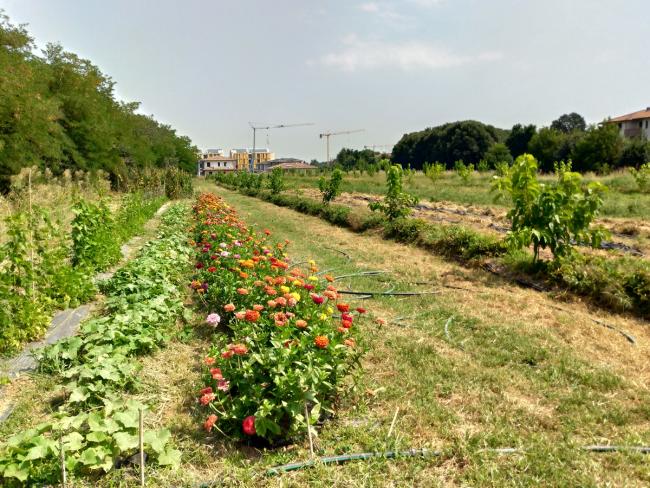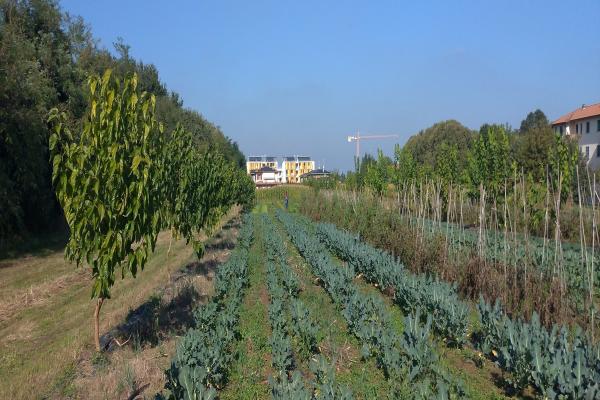Agroforestry with horticultural crops - A multifunctional farm for peri-urban areas

To develop, in areas surrounding the cities, a replicable model of multifunctional farm, which rebuild the natural vocation of the rural areas by restoring the rows of trees between the herbaceous crops (in this case vegetables), with efficient management of water, fertilizers and pesticides.
This business model, innovative for the peri-urban context of the Emilia-Romagna region, has to result sustainable from the economical point of view, i.e. able to generate income from the sale of fresh or processed vegetables, according to a short-circuit practice governed by direct contacts with the citizens.
The Innovation Plan has made it possible to develop a new farm model for peri-urban areas where multifunctionality is expressed at 360 degrees, involving not only varied agricultural production but also landscape, environmental and socio-cultural aspects.
Edible Park is a horticultural farm with agroforestry (with mulberry trees) that practices an efficient management of water resources, fertilizers and pesticides, able to give income and potentially reproducible and transferable to other districts and cities. The production/processing/selling of vegetables is carried out within a few kilometres, thus significantly reducing greenhouse gas emissions due to the logistics and packaging of the products and the contribution of carbon sequestered in the wood from the trees is able to further reduce the impact.
Since 2019, a fruitful collaboration has been activated with the neighborhood supermarket in the area where the Edible Park is located, with the set up of a specific sales corner for the vegetables of the Park, available daily.
One of the innovative actions of the project involved the development of new vegetable soups and mulberry-based jams. Some references of vegetable soups were then proposed to the large-scale retail trade for distribution in their local shops under the brand of Edible Park, which thus also becomes the brand used to offer vegetable products with a marked territorial and ethical connotation, seeking a new approach to marketing.
• implementation of the agroforestry prototype with mulberry trees and horticultural crops;
• planning of the annual cycles of horticultural crops with the help of a group of concerned citizens-consumers;
• limiting the use of fertilizers and pesticides and recycling of production residues by composting;
• transformation of a portion of the vegetable production up to IV and V range to take account of citizens' habits;
• assessment of the economic and environmental sustainability (Carbon Footprint) of the proposed innovative systems;
• training, technical-scientific and educational dissemination, including through the EIPAGRI network.
The Operational Group intends to develop an agricultural business model for peri-urban areas, based on the production and direct sale of horticultural crops in an agroforestrycontext that rebuild the traditional agricultural landscape. This will mean making together a productive and a social service to the community.
According to the principles of agroforestry, on a plot of about 1 ha mulberry trees are planted in rows with the aim of a small-scale rebuilding of the traditional rural landscape, giving a contribution to carbon sequestration and biodiversity enhancement. Between the rows of trees, horticultural crops are cultivated to provide fresh or processed vegetables to the citizens of the nearby town (Reggio Emilia).
A strong promotional activity is performed with reference to the families living nearby the experimental model to make them aware of the opportunity to enjoy, at reasonable prices, of a short chain of horticultural products, strictly controlled in accordance with objective quality standards.
Different alternative food supply chain models will be experimented, as the traditional booking and direct delivery, or the use of an internet platform for a dialogue with the customer from which to collect orders.
Actions aimed at ethic and social sustainability, e.g. with the employment of people in the final phase of a period of imprisonment for their social and educational recovery, will beactivated as well.
One of the innovative actions of the project involved the development of new vegetable soups and mulberry-based jams. Some references of vegetable soups were then proposed to the large-scale retail trade for distribution in their local shops under the brand of Edible Park, which thus also becomes the brand used to offer vegetable products with a marked territorial and ethical connotation, seeking a new approach to marketing.
| Titolo/Descrizione | Url | Tipologia |
|---|---|---|
|
sito web del progetto Parco Commestibile
|
Sito web
|
|
|
CRPA
|
Link ad altri siti che ospitano informazioni del progetto
|
|
|
Fondazione CRPA
|
Link ad altri siti che ospitano informazioni del progetto
|
|
|
GOI CRPA
|
Link ad altri siti che ospitano informazioni del progetto
|
|
|
Video del Progetto
|
Materiali utili
|
|
|
Intervista
|
Materiali utili
|
|
|
Viedeo clip del progetto con risultati e prospettive
|
Materiali utili
|
|
|
Intervista su RRN MAGAZINE - Il Parco Commestibile
|
Materiali utili
|
|
|
Articolo su Gazzetta di Reggio - 23 settembre 2018
|
Materiali utili
|
|
|
Articolo sulla Rivista Agricoltura Gen-Feb 2018
|
Materiali utili
|
